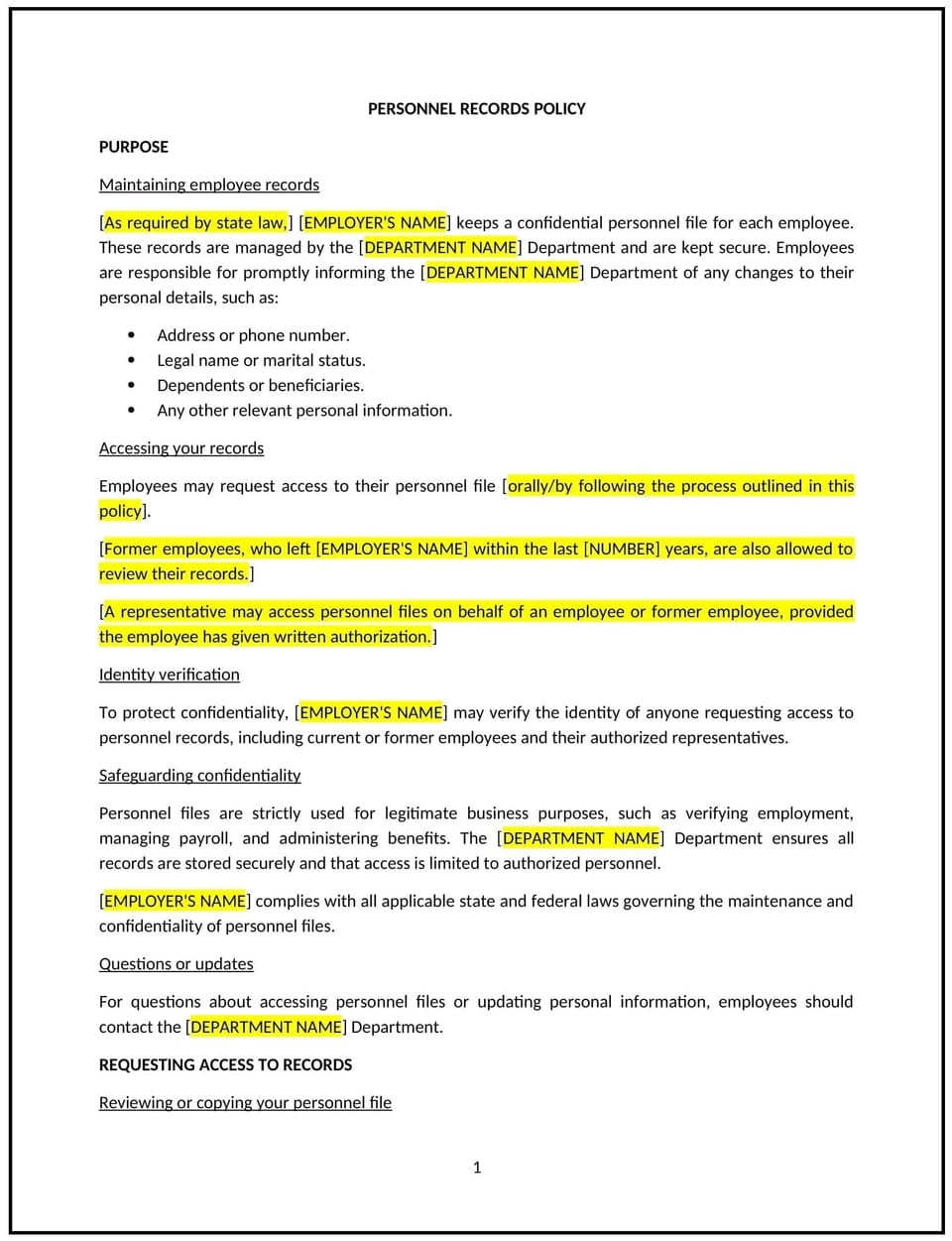Personnel records policy (Mississippi): Free template

Personnel records policy (Mississippi)
A personnel records policy establishes guidelines for how Mississippi businesses maintain, store, and manage employee records. This policy helps businesses organize personnel files, protect sensitive employee information, and determine who has access to these records. Proper record-keeping supports business operations, legal documentation, and workforce management.
By implementing this policy, businesses can ensure that employee records are securely maintained, accurately updated, and accessible only to authorized personnel.
How to use this personnel records policy (Mississippi)
- Define personnel records: Identify the types of documents included, such as job applications, payroll information, performance evaluations, and disciplinary records.
- Set access controls: Limit who can view, modify, or distribute personnel records, ensuring only authorized HR or management personnel have access.
- Establish record retention periods: Define how long different types of records should be maintained before they are securely disposed of.
- Implement secure storage methods: Store physical records in locked cabinets and digital records in encrypted or password-protected systems.
- Maintain confidentiality: Prohibit unauthorized sharing of employee records and establish confidentiality agreements where necessary.
- Outline employee access rights: Define how employees can request access to review their own personnel files and the process for making updates.
- Specify record update procedures: Establish how changes to personnel records, such as updated addresses or salary adjustments, should be documented.
- Set guidelines for record disposal: Develop secure procedures for shredding or permanently deleting outdated personnel records.
- Review and update the policy regularly: Ensure the policy reflects current business practices and regulatory considerations.
Benefits of using this personnel records policy (Mississippi)
This policy offers several benefits for Mississippi businesses:
- Protects sensitive employee information: Ensures that personal and employment data remain confidential.
- Supports compliance with record-keeping best practices: Helps businesses maintain accurate and legally required records.
- Enhances operational efficiency: Streamlines record management and retrieval processes.
- Reduces risks of data loss: Prevents accidental loss or destruction of important employee documents.
- Promotes transparency: Provides employees with a clear understanding of how their records are maintained and accessed.
Tips for using this personnel records policy (Mississippi)
- Maintain clear record categories: Separate employee records into relevant categories, such as payroll, benefits, and performance reviews.
- Train HR staff on record-keeping best practices: Ensure HR personnel understand how to handle employee records securely and efficiently.
- Regularly audit personnel records: Conduct routine checks to ensure records are accurate, up to date, and securely stored.
- Establish procedures for employee record requests: Provide employees with a structured process to review their own files.
- Securely dispose of outdated records: Use shredding or permanent deletion methods to prevent unauthorized access to disposed records.
Q: Why should Mississippi businesses implement a personnel records policy?
A: A personnel records policy helps businesses manage employee records securely, maintain organization, and ensure confidentiality.
Q: Who should have access to personnel records?
A: Only authorized HR personnel, managers, and specific individuals with a business need should have access to personnel records.
Q: How long should businesses retain personnel records?
A: Retention periods depend on the type of record, but businesses should define timeframes for keeping payroll, performance, and termination records.
Q: How can employees request access to their personnel records?
A: Businesses should establish a clear request process, outlining who employees should contact and what documents they can review.
Q: What security measures should businesses implement for personnel records?
A: Businesses should use locked storage for physical records, encryption for digital records, and access restrictions to protect sensitive information.
Q: How should outdated records be disposed of?
A: Businesses should implement secure disposal methods, such as shredding paper records and permanently deleting digital files.
Q: Can personnel records be shared with third parties?
A: Personnel records should only be shared when necessary, such as for legal purposes, with employee consent, or as required by business policies.
Q: How often should this policy be reviewed?
A: Businesses should review and update the policy annually to ensure it reflects current record-keeping practices and regulations.
This article contains general legal information and does not contain legal advice. Cobrief is not a law firm or a substitute for an attorney or law firm. The law is complex and changes often. For legal advice, please ask a lawyer.


